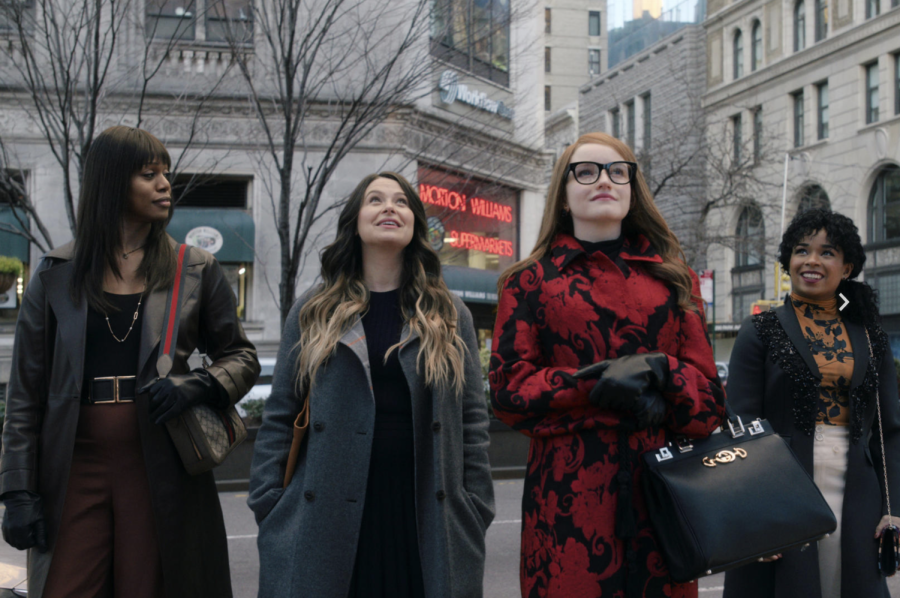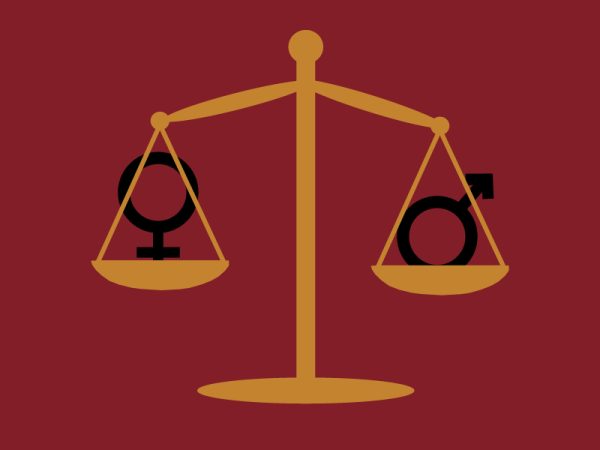Review: Netflix’s ‘Inventing Anna’ champions complex female characters
“Inventing Anna” is Netflix’s newest series focusing on women who use questionable means to get what they want. The docuseries leaves viewers unsure who to root for. Photo courtesy of Netflix.
April 4, 2022
Netflix’s “Inventing Anna,” released Feb. 11, is the latest docuseries put out by the platform, offering viewers a look into the dramatic and often messy lives of a female con artist and the women surrounding her.
The show is loosely based on the story of Anna Sorokin, more commonly known by the alias Anna Delvey, a Russian-born con artist who fooled some of the biggest names in New York into believing she was a German heiress worth millions.
Its release follows Hollywood’s newfound focus on women who don’t play by the rules, like the recent Hulu drama “The Dropout” that details the rise and fall of fraudulent Theranos founder Elizabeth Holmes and HBO Max’s “Minx” about a young feminist who helped create the first erotic magazine for women.
Inspired by the reporting of journalist Jessica Pressler, a co-producer of the show, the series follows fictional Manhattan magazine writer Vivian Kent (Anna Chlumsky). Kent is desperate to break the Delvey story and redeem herself from a blunder in her career. The show stars Julia Garner as Delvey, an intelligent and complex woman looking to climb to the top of New York society.
While the show features themes of fame, power and money, the leading women set “Inventing Anna” apart from other television dramas. As Kent digs into Delvey’s past, she finds a host of contradictions that lead her to believe there is another woman beneath the faux heiress and ruthless criminal that the media has portrayed her as.
“They will not call Anna Delvey a dumb socialite,” Delvey said in the show. “I’m smart. I’m a business woman.”
Delvey begins the show as a blonde socialite always looking for a party. But as she begins building her foundation, she takes on what she considers a more professional look: her signature glasses and auburn hair.
“No one will consider my business proposal because of how I look,” Delvey said in the show. “Think about that for a minute. If I were a man with the right accent, in the right suit, from the right Ivy League college, would I still be knocking on doors?”
When her trial began, Delvey’s courtroom outfits developed their own social media following, further skyrocketing her to fame. While society often thought of her as a clothes-obsessed socialite, the decisions that Delvey made during her rise to power were carefully calculated. She was constantly building a brand, making a name for herself.
As Kent investigates Delvey and gets closer to the truth, she finds herself obsessed with the story and inextricably connected to Delvey, even going so far as to begin caring for her in prison.
Both women grapple with high standards they set for themselves while fighting against the men in power who doubt them. Both women test the limits of their ambition to determine how far they will go to achieve what they want.
The show leaves audiences conflicted: neither Kent nor Delvey is the heroine, yet both have moments of emotional fragility and passion that leave the audience questioning who they are rooting for.
“Inventing Anna” features a number of Delvey’s victims. Among those featured are Vanity Fair writer Rachel DeLoache Williams and hotel concierge Neffatari Davis, two of Delvey’s closest friends whose characters are based on real people by the same names.
These women face complications in their personal lives and their relationship to Delvey. Both benefited from her expensive lifestyle by receiving gifts, dinners and expensive vacations. But they found themselves footing the bill in the end: When Delvey could not pay for a luxury stay in Morocco, Williams was charged $62,000 to her work account and Delvey evaded all of Williams’ attempts to be repaid.
Much of this story mirrors the real-life events detailed by Williams herself in an article for Vanity Fair. And while Williams broke down in tears testifying at Delvey’s trial, she turned her experience into a bestselling book. Williams emphasized the stress Delvey put her through, but she too played into her ambitions, using her experiences to launch her dream of becoming a writer.
Unlike Williams, Davis considered Delvey a friend even after the scammer’s fall from grace, but she could not answer many of the questions left in her wake, struggling to defend Delvey to Williams.
The show accurately depicts the complexities of female friendship: Davis’ fierce loyalty to Delvey, her resentment toward Williams and the power dynamics imposed by Delvey’s wealth and willingness to pay.
“Inventing Anna” presents its characters with ambiguity, allowing its audience to decide for themselves whose side to be on. The women wrapped up in Delvey’s schemes, including Delvey herself, are each chasing their own forms of success. The question of how far each woman is willing to go for that success is what makes “Inventing Anna” so engaging.
This story isn’t afraid to blur the line between fact and fiction, but each character is complex and imperfect in their own way — making their personalities and experiences feel realistic to imperfect audiences. Whether or not “Inventing Anna” is a hard-hitting docuseries is up for debate, but Delvey’s scammer storyline makes for anything but another simplistic TV drama.


















